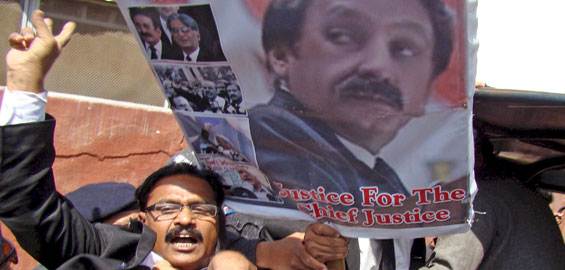Why Pakistan cares about Chaudhry
Al Jazeera examines why the deposed chief justice is a controversial figure.

 |
| The campaign to reinstate the sacked chief justice became a popular cause [EPA] |
Why is Pakistan’s deposed chief justice causing such a political storm?
Iftikhar Chaudhry became a supreme court judge in 2000 and was appointed as the youngest ever chief justice in June 2005.
He was sacked from the position by Pervez Musharraf, who led Pakistan from 1999 to 2008, and the campaign for his reinstatement, which has seen multiple street protests, became a popular cause in Pakistan.
When Ali Asif Zardari, who took over as leader of the Pakistan People’s Party (PPP) on the death of his wife, Benazir Bhutto, became president, he formed a coalition on the basis that he would reinstate Chaudhry.
Zardari enticed Nawaz Sharif, the leader of the leader of the Pakistan Muslim League-Nawaz (PML-N), to join him by promising to reinstate Chaudhry but Sharif soon declared it was apparent Zardari was going back this agreement and pulled out of the government.
Why is Chaudhry such a controversial figure?
As chief justice, Chaudhry used his position to reopen a number of cases, including one into the disappearance of people picked up by security agencies on suspicion of being involved in “terrorism”.
He ordered the security agencies to produce people, thought to be “missing”, in court.
He upset a number of prominent people, including Shaukat Aziz, prime minister under Musharraf, by taking up a case looking into the privatisation of a steel firm and cancelling the sale.
Chaudhry was also widely expected to try and insist Musharraf stand down as army chief – a constitutional requirement – in order to seek another term as president.
What happened next?
Musharraf’s administration pressured Chaudhry to quit, but he refused to go, and on March 9, 2007, Musharraf suspended Chaudhry, accusing him of abusing his position.
 |
| As chief justice, Chaudhry upset a number of prominent government officials [AFP] |
A panel of judges was established to look into the accusations against Chaudhry, who appointed Aitzaz Ahsan, a parliamentarian and former minister from the PPP, to lead his defence team.
Protesting lawyers, led by Ahsan, held rallies to demand the independence of the judiciary and both the PPP and the PML-N got behind the cause.
In July 2007, the judges delivered the first ever finding against a military ruler by lifting Musharraf’s suspension of Chaudhry.
Musharraf engineered his re-election anyway by a subservient parliament in October without stepping down as army chief and while the supreme court allowed the vote to go ahead, it deliberated over whether the result should stand.
Musharraf declared emergency rule, sacked the judges and only reinstated those who took a fresh oath of office, which Chaudhry refused to do.
Having secured the presidency, Musharraf stepped down as army chief.
Chaudhry declared Musharraf’s actions unconstitutional.
With Musharraf gone, why was Chaudhry not reinstated?
The PPP came to power off the back of the assassination of Benazir Bhutto and the popular sentiment over the judges.
But after it won elections, despite reinstating most of the judges sacked by Musharraf, Chaudhry remained deposed.
Analysts say Zardari worries that Chaudhry could rule Musharraf an illegal president and overturn an amnesty given to Zardari and Bhutto in 2007 that allowed them to return to Pakistan without fear of prosecution on corruption charges, which they said were politically motivated.
They say that Zardari is resisting reinstating the judges for fear they might revoke his protection from corruption charges.
“The return of Benazir Bhutto and Zardari to Pakistan took place under a deal with Mushrraf in 2007. As part of the deal all the corruption charges, through a special presidential ordinance called NRO [National Reconciliation Ordinance], were removed, against Zardari especially,” Ishtiaq Ahmad, a professor of international relations at Islamabad’s Qaid-e-Azam University, told Al Jazeera.
“The NRO remains, but the fear of the Zardari-led regime is, if they restore chief justice Chaudhry – given his assertive background – the NRO might be revoked and then obviously all those charges will come back to haunt Zardari and other party leaders.”
Following intense opposition protest, the government climbed down and on March 16, 2009, announced that Chaudhry would be reinstated.
The date given for his reinstatement is March 21.